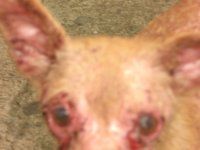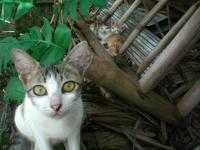Source: www.pet-grub.com
If you wish to quickly print this entire book with the greatest of ease, please read the following page:
The 5 Elements — An Introduction
Sponsored Links
Food provides nutrition and nutrition is energy. But there are different types of energy according to traditional Chinese herbal medicine — 5 energies to be exact.
These 5 energies are known just as that, the five energies
or the five elements
.
The Chinese say that as food grows, each phase corresponds to one of the five energies.
The five energies or elements are given names that come from nature and they are:
- Fire
- Earth
- Metal
- Water
- Wood
Fire is an energy that goes upwards, like a flame. This is a powerful energy as it radiates heat and light.
Earth energy is said to move in a more horizontal and circular nature, similar to the Earth turning on its axis, creating stability and balance.
Metal is said to go inward and like metal, it''s more strong or intense.
Water energy goes downwards, like rain from the sky or a waterfall, descending to a point of maximum rest and concentration.
Wood symbolizes growth outward like a tree growing in nature.
In traditional Chinese Cooking, there is something called 5 spices
which you can get as a seasoning to add to your meals. The Chinese created the 5 spices
because it contains each of the above 5 energies. The Chinese say we must have each of the 5 energies in our daily diet for health and wellness.
The 5 spices
is not something you are going to give your dog or cat, it''s just something I am telling you. But understanding the 5 elements will help you understand what comes further on this page.
The 5 Elements Is Not All About Food
Understanding the five elements or energies helps us to understand the natural world and how these five energies work in nature to create balance and harmony.
How we wash, what we store food in, how we chop meat or vegetables — all of this affects, in different ways the energy of the food. Understanding this help us create a more balanced and healthy life for our pets — and us too.
The five elements, when related to food, is often referred to as feng shui cooking. All traditional Chinese cooking is based on the yin and yang energies of food along with the 5 elements.
Believe it or not, but Confucius had a big impact on Chinese health and cooking. Confucius was more than a philosopher or wise man, but he was also a herbalist. He helped to create Shandong Cuisine, which has more strict rules and guidelines, as compared to Cantonese Cooking, which you find in most Chinese restaurants.
Although cuisines such as Cantonese are less strict, they are based upon Shandong Cuisine, which influenced all other forms of Chinese cooking.
The 5 Elements In Nature
Earth — everything we eat grows either from the earth such as plants and vegetation or is nourished by the earth, such as livestock. Our pets get some earth energy when they eat meat.
Water — water was, in the past, and still is used today, for transportation. Whether it be rivers, oceans or lakes, water is a mode of transportation. Obviously, our pets have water in their diet and so they are not missing this energy. However, without a healthy diet, our pets cannot have good blood flow. Within the body, the blood is the river that transports the nutrients to the cells.
Metal — when cooking food, some metal from the fry pan, etc will go into the food. But with our pets, since we are feeding raw meat, they don''t necessarily get metal in this way. They do, however, get metal energy from the metal knife or blade that cuts the meat.
Wood — this is an interesting energy. Wood has a characteristic of expanding outward. This is essentially the nutrients being absorbed by the body and being turned into life for the body, growth for the body. Without wood energy, puppies would not grow, kittens would not grow and so on.
Fire — when one cooks the food, the food gets heat or fire. The Chinese say fire purifies and fire provides a profound transformation of the food. While we are feeding raw meat diet, obviously the fire is missing and I must be honest in that I don''t know where the fire in their diet comes from. However, considering dogs and cats have 15 times more hydrochloric acid in their stomach, which purifies the meat and kills bacteria, I like to think that this is the fire for our pets. But in addition to the strong hydrochloric acid, our pets are also eating meat with some fat on it and fat has yang energy.
Of course, the five elements or energies were designed, or thought of, in terms of human health. But it''s interesting how it can be applied to our pets too. Our pets will have different requirements than we humans do.
Storing Food
I am providing the following because you might find it beneficial for your own health or interest. But also, some of it can be used to benefit your pets too.
Clay, glass, porcelain and earthenware containers have earth
energy. The best things to store in these sorts of containers are sugar, salt, pepper, pickles, dried noodles (pasta) and nuts. It is said that sugar, salt and pepper should not be exposed to the light either and so they should be stored in opaque containers.
Wood containers, including bamboo containers, allow oxygen flow because they breathe. Tea, breads and cereals can be kept in wood container. Items that can go moldy often store better in wood containers. Obviously, wood containers have a wood
energy.
Metal containers of any kind along with plastic containers should be avoided. According to Chinese Feng Shui, products like cheese along with other living products begin to sweat
inside these sorts of containers because they essentially can''t breathe. These sorts of containers are also not good because they absorb the odors of the foods stored within them. In Feng Shui, metal containers have metal
energy while plastic containers have fire
energy.
Many people in the olden days would have cold storages or cellars built into the earth. This area wasn''t frozen but it was cool, dark and part of the Earth. In traditional or classical Chinese culture, they also observe a similar thing. They noticed that a storeroom beneath or next to the kitchen was the ideal place for storing vegetables. Of course, there was no heating back then and so then vegetable storage area stayed cool. Additionally, the heat of the day and sun did not affect the vegetables being stored.
Ultimately, the Chinese went on to realize that the vegetables stayed fresh longer if they remained in close contact to the earth from which they came. From this, a tradition was developed in China whereby the vegetables would be placed on the floors of the peasant''s storehouses.
In the modern day world, the best place to store vegetables that don''t need to be refrigerated would be in a separate and cool walk–in closet or storage room that is away from direct sunlight and usually near the basement so it closer to the earth. Also you want either no windows at all or very few. Additionally you want a location that is not damp. Ceramic flooring and walls is the best choice because it''s made using Earth ingredients. The vegetables, in this sort of situation can then just be placed on the floor. Many people find this actually works better than a refrigerator, which is actually quite damp.
If you want to take this a little bit further, according to the teachings of Feng Shui, you should then store dry foods on the racks. Of course, prevent direct sunlight if there are windows.
I Went Off Track A Little (:
I know I went off track a little talking about storage and the 5 elements, but I thought it was worth it. But now that you have a basic understanding of the five elements or energies, let''s learn more about them.
Learn More About Holistic Health and Nutrition For Pets
Keep reading by choosing another page or topic.
 Meet Jumbo, the participant in
Meet Jumbo, the participant in 